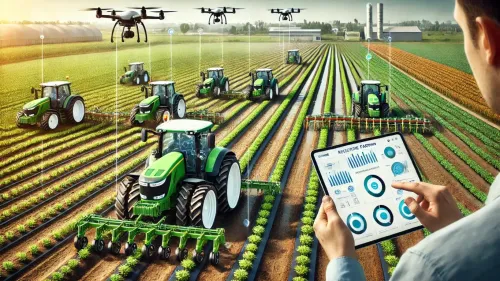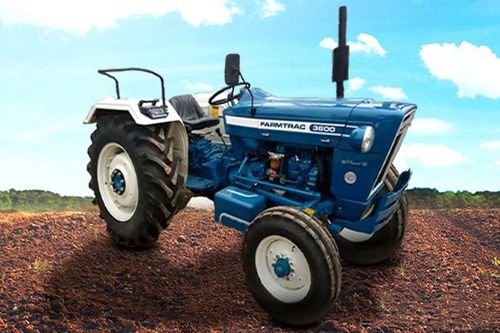Ad
Ad
Organic Farming: Pest Management Strategies for Sustainable Growth

Organic farming has gained popularity in recent years as consumers increasingly demand environmentally friendly and health-conscious agricultural practices. One of the fundamental concepts of organic farming is to avoid the use of synthetic chemicals, including pesticides, in favour of more sustainable and natural pest management methods.
What is Organic Farming?
Organic farming is a method of farming that relies on natural manure and processes to grow crops and raise livestock. It is an environmentally friendly and sustainable way of farming that has gained popularity in recent years.
Organic farming is a method of agriculture that avoids the use of synthetic pesticides, fertilizers, genetically modified organisms, and growth hormones. Instead, it relies on natural processes, such as crop rotation, composting, and biological pest control, to maintain soil fertility and control pests.
Organic farmers prioritize sustainability, biodiversity, and the well-being of the environment. By promoting healthier soil and ecosystems, organic farming aims to produce food that is free from harmful residues and supports long-term ecological balance.
Despite its ecological advantages in promoting sustainable farming practices, organic farming often faces challenges, including higher food costs and generally lower yields compared to conventional agriculture. In this article, we discussed various pest management strategies used in organic farming to ensure sustainable growth.
Also Read: Top 5 Vegetable Farming In December For Higher Yield & Profits
Pest Management in Organic Agriculture
Organic farming is an agricultural approach that relies on ecologically friendly methods for pest control and biological fertilizers primarily derived from animal wastes and nitrogen-fixing cover crops.
Pest management is an important aspect of organic farming. Organic farmers use a variety of techniques to manage pests, including appropriate cropping techniques, biological control, and natural pesticides.
Crop Rotation
Appropriate cropping techniques include crop rotation, intercropping, and mixed cropping. These techniques help to reduce pest populations by disrupting their life cycles and reducing their food sources.
Crop rotation is a fundamental practice in organic farming that involves rotating the types of crops planted in a specific area over time. This strategy disrupts the life cycles of pests that are specific to certain crops, reducing the risk of infestations.
Additionally, different crops have varying nutrient needs, and rotating crops helps maintain soil fertility and structure.
Beneficial Insects
Encouraging the presence of natural predators can be an effective method of pest control in organic farming. Ladybugs, predatory beetles, lacewings, and parasitic wasps are examples of beneficial insects that feed on harmful pests.
Creating a habitat that supports these insects, such as providing flowering plants for nectar, can help maintain a balanced ecosystem on the farm. Biological control involves using natural predators and parasites to control pest populations.
This can include introducing beneficial insects, such as ladybugs and lacewings, into the environment to kill pests. Natural pesticides are derived from natural sources, such as plants and minerals. These pesticides are less toxic than synthetic pesticides and break down more quickly in the environment.
Companion Planting
Companion planting involves cultivating combinations of crops that have mutually beneficial relationships. Some plants can repel pests or attract beneficial insects that prey on harmful pests.
For example, planting marigolds with tomatoes can deter nematodes, while growing basil with tomatoes can enhance the flavor of tomatoes and repel certain pests.
Neem Oil and Other Botanical Extracts
Organic farmers often use botanical extracts, such as neem oil, as natural pesticides. Neem oil is derived from the neem tree and has insecticidal properties. It disrupts the feeding and reproductive cycles of pests without harming beneficial insects.
Similarly, other botanical extracts like pyrethrum, derived from chrysanthemum flowers, can be effective against a range of pests.
Natural Barriers
Physical barriers can be employed to prevent pests from reaching crops. For example, row covers made of lightweight fabric can be used to protect plants from flying insects. Additionally, creating buffer zones with native vegetation can act as a natural barrier, reducing the risk of pest migration from surrounding areas.
Biological Control Agents
In addition to beneficial insects, organic farmers may introduce specific biological control agents to manage pest populations. Examples include nematodes that target soil-dwelling pests, and predatory mites that feed on harmful mites. These agents provide targeted and natural solutions to pest problems without the need for synthetic chemicals.
Trap Crops
Growing trap crops involves planting certain plants that are particularly attractive to pests. The idea is to draw pests away from the main crops and concentrate them on the trap crops. Once the pests have congregated, they can be more easily managed through various means, such as manual removal or targeted pesticide application.
Strategies for Sustainable Growth
Sustainable growth is an important goal of organic farming. Organic farmers can use a variety of strategies to achieve sustainable growth, including crop rotation, environmental variation, natural pests, organic manures, and appropriate chemical, thermal, and biological action.
Natural pests, such as weeds and insects, can be managed using a variety of techniques, including crop rotation, intercropping, and mixed cropping. Organic manures, such as compost and animal manure, can be used to improve soil fertility and reduce the need for synthetic fertilizers.
Crop rotation involves rotating crops between different fields to reduce soil-borne diseases and pests. Environmental variation involves creating diverse habitats within the farm to encourage natural predators and parasites.
Appropriate chemical, thermal, and biological action can be used to manage pests and diseases. For example, hot water treatment can be used to control seed-borne diseases, and biological control agents can be used to control insect pests.
Also Read: Winter Pest Control in Cherry Orchards
Conclusion
In conclusion, organic farming is an environmentally friendly and sustainable way of farming that relies on natural inputs and processes to grow crops and raise livestock. Pest management is an important aspect of organic farming, and organic farmers use a variety of techniques to manage pests.
By implementing strategies such as crop rotation, companion planting, promoting beneficial insects, using botanical extracts, and employing biological control agents, organic farmers can maintain healthy and productive ecosystems while producing high-quality crops.
By using sustainable pest management strategies, organic farmers can achieve sustainable growth and help to protect the environment.
Features & Articles
Top 5 Mileage-Friendly Tractors in India 2025: Best Choices for Saving Diesel
Discover the top 5 best mileage tractors in India 2025 and learn 5 easy diesel-saving tips to boost your farm savings....
02-Jul-25 11:50 AM
Read Full NewsTop 5 John Deere Tractors in India 2025: Full Comparison of Features, Performance, and Pricing
Explore top 5 John Deere tractors in 2025 with features, performance, prices, and full comparison for Indian farmers....
19-Jun-25 12:11 PM
Read Full NewsTop 5 Swaraj Tractors for Indian Farmers in 2025
Explore the top 5 Swaraj tractors in India, offering power, durability, and performance for every type of Indian farmer....
02-Jun-25 10:06 AM
Read Full NewsThinking of Buying a Second Hand Tractor? Read These Top 10 Important Tips
Explore key tips to inspect the engine, tyres, brakes, and more before buying a second hand tractor in India....
14-Apr-25 08:54 AM
Read Full NewsComprehensive Guide to Tractor Transmission System: Types, Functions, and Future Innovations
Learn about tractor transmission types, components, functions, and selection factors to enhance efficiency, performance, and agricultural productivity....
12-Mar-25 09:14 AM
Read Full NewsModern Tractors and Precision Farming: Transforming Agriculture for Sustainability
Precision farming enhances agriculture by integrating GPS, AI, and modern tractors for sustainable, efficient, and productive farming practices in India....
05-Feb-25 11:57 AM
Read Full NewsAd
Ad
As featured on:


Registered Office Address
Delente Technologies Pvt. Ltd.
M3M Cosmopolitan, 12th Cosmopolitan,
Golf Course Ext Rd, Sector 66, Gurugram, Haryana
pincode - 122002




















